Parse failure for https://anti-empire.com/feed/. Last Retry Monday January 05, 2026 02:45
Indymedia Ireland is a volunteer-run non-commercial open publishing website for local and international news, opinion & analysis, press releases and events. Its main objective is to enable the public to participate in reporting and analysis of the news and other important events and aspects of our daily lives and thereby give a voice to people.
 Fraud and mismanagement at University College Cork Thu Aug 28, 2025 18:30 | Calli Morganite Fraud and mismanagement at University College Cork Thu Aug 28, 2025 18:30 | Calli Morganite
UCC has paid huge sums to a criminal professor
This story is not for republication. I bear responsibility for the things I write. I have read the guidelines and understand that I must not write anything untrue, and I won't.
This is a public interest story about a complete failure of governance and management at UCC.
 Deliberate Design Flaw In ChatGPT-5 Sun Aug 17, 2025 08:04 | Mind Agent Deliberate Design Flaw In ChatGPT-5 Sun Aug 17, 2025 08:04 | Mind Agent
Socratic Dialog Between ChatGPT-5 and Mind Agent Reveals Fatal and Deliberate 'Design by Construction' Flaw
This design flaw in ChatGPT-5's default epistemic mode subverts what the much touted ChatGPT-5 can do... so long as the flaw is not tickled, any usage should be fine---The epistemological question is: how would anyone in the public, includes you reading this (since no one is all knowing), in an unfamiliar domain know whether or not the flaw has been tickled when seeking information or understanding of a domain without prior knowledge of that domain???!
This analysis is a pretty unique and significant contribution to the space of empirical evaluation of LLMs that exist in AI public world... at least thus far, as far as I am aware! For what it's worth--as if anyone in the ChatGPT universe cares as they pile up on using the "PhD level scholar in your pocket".
According to GPT-5, and according to my tests, this flaw exists in all LLMs... What is revealing is the deduction GPT-5 made: Why ?design choice? starts looking like ?deliberate flaw?.
People are paying $200 a month to not just ChatGPT, but all major LLMs have similar Pro pricing! I bet they, like the normal user of free ChatGPT, stay in LLM's default mode where the flaw manifests itself. As it did in this evaluation.
 AI Reach: Gemini Reasoning Question of God Sat Aug 02, 2025 20:00 | Mind Agent AI Reach: Gemini Reasoning Question of God Sat Aug 02, 2025 20:00 | Mind Agent
Evaluating Semantic Reasoning Capability of AI Chatbot on Ontologically Deep Abstract (bias neutral) Thought
I have been evaluating AI Chatbot agents for their epistemic limits over the past two months, and have tested all major AI Agents, ChatGPT, Grok, Claude, Perplexity, and DeepSeek, for their epistemic limits and their negative impact as information gate-keepers.... Today I decided to test for how AI could be the boon for humanity in other positive areas, such as in completely abstract realms, such as metaphysical thought. Meaning, I wanted to test the LLMs for Positives beyond what most researchers benchmark these for, or have expressed in the approx. 2500 Turing tests in Humanity?s Last Exam.. And I chose as my first candidate, Google DeepMind's Gemini as I had not evaluated it before on anything.
 Israeli Human Rights Group B'Tselem finally Admits It is Genocide releasing Our Genocide report Fri Aug 01, 2025 23:54 | 1 of indy Israeli Human Rights Group B'Tselem finally Admits It is Genocide releasing Our Genocide report Fri Aug 01, 2025 23:54 | 1 of indy
We have all known it for over 2 years that it is a genocide in Gaza
Israeli human rights group B'Tselem has finally admitted what everyone else outside Israel has known for two years is that the Israeli state is carrying out a genocide in Gaza
Western governments like the USA are complicit in it as they have been supplying the huge bombs and missiles used by Israel and dropped on innocent civilians in Gaza. One phone call from the USA regime could have ended it at any point. However many other countries are complicity with their tacit approval and neighboring Arab countries have been pretty spinless too in their support
With the release of this report titled: Our Genocide -there is a good chance this will make it okay for more people within Israel itself to speak out and do something about it despite the fact that many there are actually in support of the Gaza
 China?s CITY WIDE CASH SEIZURES Begin ? ATMs Frozen, Digital Yuan FORCED Overnight Wed Jul 30, 2025 21:40 | 1 of indy China?s CITY WIDE CASH SEIZURES Begin ? ATMs Frozen, Digital Yuan FORCED Overnight Wed Jul 30, 2025 21:40 | 1 of indy
This story is unverified but it is very instructive of what will happen when cash is removed
THIS STORY IS UNVERIFIED BUT PLEASE WATCH THE VIDEO OR READ THE TRANSCRIPT AS IT GIVES AN VERY GOOD IDEA OF WHAT A CASHLESS SOCIETY WILL LOOK LIKE. And it ain't pretty
A single video report has come out of China claiming China's biggest cities are now cashless, not by choice, but by force. The report goes on to claim ATMs have gone dark, vaults are being emptied. And overnight (July 20 into 21), the digital yuan is the only currency allowed. The Saker >>
Interested in maladministration. Estd. 2005
 RTEs Sarah McInerney ? Fianna Fail?supporter? Anthony RTEs Sarah McInerney ? Fianna Fail?supporter? Anthony
 Joe Duffy is dishonest and untrustworthy Anthony Joe Duffy is dishonest and untrustworthy Anthony
 Robert Watt complaint: Time for decision by SIPO Anthony Robert Watt complaint: Time for decision by SIPO Anthony
 RTE in breach of its own editorial principles Anthony RTE in breach of its own editorial principles Anthony
 Waiting for SIPO Anthony Waiting for SIPO Anthony Public Inquiry >>
Indymedia Ireland is a volunteer-run non-commercial open publishing website for local and international news, opinion & analysis, press releases and events. Its main objective is to enable the public to participate in reporting and analysis of the news and other important events and aspects of our daily lives and thereby give a voice to people.
 Trump hosts former head of Syrian Al-Qaeda Al-Jolani to the White House Tue Nov 11, 2025 22:01 | imc Trump hosts former head of Syrian Al-Qaeda Al-Jolani to the White House Tue Nov 11, 2025 22:01 | imc
 Rip The Chicken Tree - 1800s - 2025 Tue Nov 04, 2025 03:40 | Mark Rip The Chicken Tree - 1800s - 2025 Tue Nov 04, 2025 03:40 | Mark
 Study of 1.7 Million Children: Heart Damage Only Found in Covid-Vaxxed Kids Sat Nov 01, 2025 00:44 | imc Study of 1.7 Million Children: Heart Damage Only Found in Covid-Vaxxed Kids Sat Nov 01, 2025 00:44 | imc
 The Golden Haro Fri Oct 31, 2025 12:39 | Paul Ryan The Golden Haro Fri Oct 31, 2025 12:39 | Paul Ryan
 Top Scientists Confirm Covid Shots Cause Heart Attacks in Children Sun Oct 05, 2025 21:31 | imc Top Scientists Confirm Covid Shots Cause Heart Attacks in Children Sun Oct 05, 2025 21:31 | imc Human Rights in Ireland >>
|
On The 75th Anniversary Of The Nazi Bombing Of Gernika – Where Are The Basques Headed?
 international |
rights, freedoms and repression |
feature international |
rights, freedoms and repression |
feature
 Wednesday April 25, 2012 16:37 Wednesday April 25, 2012 16:37 by Cormac Mac Gall by Cormac Mac Gall

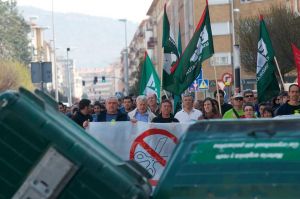
Basque trade union barricade during general strike in March
A political struggle in a European nation of less than three million, largely ignored by other socialists in Europe, has nevertheless come to the fore in the capitalist media repeatedly since the late 1960s. This has been largely as a result of the the Basque people’s struggle for socialism and independence from the Spanish and French states, a struggle led for decades by Euskadi Ta Askatasuna, the marxist armed organisation better known by its acronym, ETA. The organisation reawakened Basque national consciousness, has worked with others for the restoration of Euskara, the Basque language, organised Basque workers and faced the repression of the General Franco dictatorship in the Spanish state. Famously, in 1973 it assassinated the Prime Minister of the state, Admiral Carrero Blanco, Franco’s right-hand man, which hastened the fragmentation of the dictatorship and its passage to partial democracy.
Related Links:
The Abertzale Left makes big electoral gains in the basque Country – but is it being steered towards social democracy? |
Basque Trade Unions Square Up To The Spanish State |
Report on the largest demo ever in the Basque Country, estimated 100,000, Bilbao January this year -- in solidarity with political prisoners
ETA has been on official truce since January 2011 (and effectively for months earlier) and says it has permanently eschewed armed struggle. The war seems over but French and Spanish state repression continues. Recently ETA suspects were arrested in France and allegations of torture of detainees persist in the southern country, i.e. that under Spanish rule. Around 700 political prisoners are dispersed through jails across the territories of both states. In February 2012, speaking in Dublin, a representative of Herrira, the new organisation created to agitate for the return home of Basque political prisoners and for improvement in their conditions, painted a dark picture of the prisoners’ conditions. They are kept in solitary confinement far more than the average prisoner, their sentences have been increased to what are in reality life sentences and some have contracted tuberculosis, a disease nearly eradicated in Europe. Many have developed mental illnesses and some have committed suicide; in addition many are seriously or even terminally ill with physical ailments.
On the purely political front, many political parties, platforms and youth organisations of the Abertzale (i.e. “patriotic” or “pro-independence”) Left movement have been banned. This has prevented the movement from presenting itself at elections, despite many attempts to do so. The conservative PNV (Basque National Party) may have initially welcomed the removal of their socialist Basque rivals but there were unforseen consequences for them: after the ‘autonomous’ regional government elections in 2009, the right-wing Partido Popular and the social-democratic Partido Socialista Obrero de Espana, the Basque versions of the main Spanish parties, combined to outvote the PNV by a majority of one, to give the PP the Presidency and control of the Basque Autonomous Region, entailing among other things control of the ETB (Basque television station). Had the Abertzale Left been permitted to participate in the elections, their elected representatives would have united with the PNV to outvote the pro-Spanish parties.
The most recently-banned political platform of the Abertzale Left was Sortu – despite its constitution rejecting violence “including that of ETA” and undertaking to expel from the party any member who advocated it. The Spanish National Court decided what it always does, that this is just ETA in another form. To which some constitutional democrats retort: “If you don’t allow them to present themselves as a political party for election, what options are you allowing them except the armed one?” Spanish politicians in the past said that ETA should cease armed struggle but when it was on ceasefire, then said that it must give up armed struggle permanently. Now that it appears to have done so, they say it must give up its weapons and disband. The overtures of the Abertzale Left are all unilateral, without corresponding moves by the Spanish state.
When the National Court barred Sortu from participating in the elections for regional government and for local authorities, the Abertzale Left presented themselves as individuals in Bildu, in coalition with the social-democratic pro-independence parties of Eusko Alkartasuna and Alternatiba. Yet again the coalition was banned by the Supreme Court but that ban was overturned in May 2011 on appeal by the Constitutional Court (which however has not overturned the ban on Sortu). The election results were a huge success for the new coalition and, with more time to prepare and to campaign, would probably have been even better. In three of the southern provinces, the new party received 25% of the vote, second only to the Basque Nationalist Party (29%) and even in Nafarroa got 11%. The coalition now runs many local authorities as well as the large one of Donosti/ San Sebastian.
In November last year, a general election was held across the Spanish state and the Abertzale Left entered into yet another but wider coalition, which included another social-democratic party, Aralar. The new coalition, Amaiur, won seven seats to the Spanish parliament, the Cortes, and three to the Senate.
Coalitions and new policies bring tensions within the Abertzale Left movement.
What many people outside the Basque Country want to know is where it is heading for now? Is their peace process going to succeed with the Spanish state? Is the process sufficiently supported within the Abertzale Left organisation and their wider movement? Initial conversations with people in the organisation, especially those close to the leadership of a number of its organs, elicit the response that all is well and that great political progress is being made. But what of their repeated reliance on the examples of the Irish and South African peace processes? The first is increasingly seen as failed with regard to unification and independence, with the second as little more than the admission to the white capitalist club of a handful of black capitalists and their middle-class support.
“These are examples to convince the Spanish state and the international community,” is the standard response. “The Basque Country is not Ireland,” they emphasise. “Our movement is large and wide and has not only a political expression but a wide social and cultural one too.”
But when one probes a little deeper and enquires more widely, one finds quite different responses. These range from unease, through suspicion to a total rejection of the process and the direction of the organisation, its statements and even alliances. Even the campaign to free Arnaldo Otegi, a jailed leading member of the Abertzale Left and a prime mover of the new process, ran into internal opposition. “Why a campaign for him? Why set him apart from all the other prisoners?” was the response of many. “We have never elevated one leader in our movement, never had the cult of personality.”
Political prisoners
The issue of Basque political prisoners dispersed across the Spanish and French states and is a major one, not just for the Abertzale Left movement but for the whole of Basque society. The pro-Spanish Basque police, the Ertzaintza (nicknamed “Zipayos” or “Sepoys”), regularly harasses ceremonies welcoming (ongi etorri) home released prisoners and removes photos of prisoners from bars and other public places. According to the Spanish National Court, such displays are “glorification of terrorism” and numbers of Abertzale Left people are awaiting trial on that charge.
Despite that, small banners calling for the prisoners to come home can be seen hanging from bars and balconies here and there throughout the country, weekly vigils are held for the prisoners and the annual solidarity demonstration in January is huge. This year’s, in Bilbao, at 110,000, is believed to have been the largest demonstration ever in the Basque Country.
Despite there being no sign of such an overture yet, could the release of the prisoners be a sufficient prize to convince the doubters in the movement to support the Process? “Perhaps, perhaps not,” is the response of some. “Not all the prisoners were part of the decision to issue a statement supporting the Process; some of the prisoners are saying that they do not want to come out if it is for any thing less than an independent and socialist Basque Country. They say: ‘It was not for this that we risked life and liberty and that so many of our comrades died.’”
How the internal opposition will manifest itself and how successful they will be remains to be seen. Most activists shy away from the prospect of a split in the movement, being aware of those that occurred in 1974 and 1982. However, it also true that the internal struggles that led to those splits clarified a number of key ideological issues at the time and that the movement, particularly ETA (its dominant expression in those years), emerged stronger as a result and thereafter grew quickly.
It is difficult at this moment to assess the prospects of those who wish to change the current direction of the movement. The small group of marxist-leninists Kimetz Kolektiboa, has chosen to step outside the Abertzale Left and say others should do the same, joining to form a Basque communist party. “The movement for independence and especially for socialism must be led by the working class”, they say, “and that is impossible without the class having its own party.”
But most critics have chosen to remain within the Abertzale Left movement, at least for the moment, agitating for the changes they wish to see. “It is very cold outside the wide organisation”, said one of these recently. The formation of a different political party within the Abertzale Left is not permitted; however a multiplicity of groups, collectives and associations abound, each with their own web pages and often their own newspapers, such as EHK, another group of marxist-leninists but working within the movement.
It is not from the socialist perspective alone that the current direction and Abertzale Left leadership faces internal criticism; some, including ex-prisoners, whose main objective is an independent Basque Country, fear that all that can be achieved with the current direction is some other type of regional autonomy in which they will be permitted to participate politically, whereas their wish is for total independence and unification of their nation.
Basque Youth
A key issue, of course, is which way the youth will go. It was Abertzale Left youth who founded the political group ETA back at the end of the 1960s, inspired by the Cuban revolution and the anti-colonial struggle in Algeria. Then the patriotic youth from EGI, a group within the Basque Nationalist Party, joined ETA in mass to swell its ranks. It was mainly the youth who painted the slogans, put up the posters and, until very recently, fought the Ertzaintza police in kale borroka (“street fighting”) when the Spanish National Court banned demonstrations.
The youth are not a homogenous group but they tend towards a more radical outlook and often occupy empty buildings to set up their own social centres (gastetxeak). However, many of their organisations have been banned and their leading activists arrested, tortured and imprisoned. They are palpably uneasy. In 2009, after Irish Republican “dissidents” had killed two British soldiers and a PSNI officer, Batasuna (political party of the Abertzale Left, banned in the Spanish state but not in the French) issued a statement of fulsome praise for the Provisionals’ leadership and, implicitly, for the peace process. Two Basque youth published a critical letter in response. Although they subsequently remained silent, at least in print, it is clear that they are representative of a substantial sector. “One cannot, even if one disagrees with their actions or the timing, call Republicans who kill colonial police and imperialist troops ‘traitors’” was said by many Basque youth in conversation (a reference to Martin McGuinness’ condemnation at the time, just prior to the Batasuna statement of support).
Basque Trade unions lead the way
Another “augmentation of forces” which preceded the recent political alliances of the Abertzale Left was that of their trade union LAB with the other main Basque trade union, ELA (the latter originally formed by the Catholic conservative Basque Nationalist Party, as a counter to “foreign” and radical trade union influences). Both unions together have the majority membership in the southern Basque Country, outnumbering the Basque membership of the Spanish-unionist trade unions of Comisones Obreras and the UGT. The Basque unions LAB and ELA, along with smaller Basque trade unions, have held a number of one-day general strikes against the extension of the pensionable age and of cuts in services.
The political victories of Bildu in local and regional government have strained the alliance of LAB and ELA, leaving some in the latter union feeling left out as their partner LAB supports the new political alliances and their management of local government. Nevertheless, both unions announced a one-day general strike in the Basque Country, set for March 9th, specifically against the recent labour “reforms” of the new Partido Popular government, enacted by decree without passing through the Spanish Parliament. The pro-Gallician independence trade union confederation of the INTG chose that day for a general strike in their own nation. That initiative then snowballed and became a strike day for the whole Spanish state, which big collaborationist trade unions Comisiones and UGT found themselves forced to support.
The only certain thing in the Basque Country at the moment is that nothing is certain in the near future, which means that there are interesting times ahead.
Note: Euskal Herria (The Basque Country) consists of seven provinces, three in Iparralde (“the Northern country”) on the French side of the border and four on the Spanish side (Hegoalde -- “the Southern country”). Many Europeans will be familiar with tourist destinations in Euskal Herria like the port of Biarritz, Bilbao, San Sebastian/ Donostia and Pamplona (where some people like to risk their lives during the festival of San Fermín, running from bulls in the street). Most of the Camino de Santiago runs through their country.
The total population is less than three million, the greater part of which is in the southern part of the country. Some areas are heavily industrialised while others are agricultural – some of the Rioja wine region is in their country and they have an active fishing industry. The native language is Euskara (Basque Language), one of the non-Indo-European original languages of Europe, which was banned under the Franco dictatorship (1936- 1975), and its number of speakers grows steadily.
The (post-Franco) Constitution of 1978 was agreed by a majority in the Spanish state but not in the Basque Country. It is a progressive document in terms of civil rights but it has been negated by the police actions, laws and decrees of the Spanish state with regard to the Basques (and to a lesser degree, of the Catalans and Gallicians). The regional autonomy granted by the Consitution to the Navarra province, as well as to the regional Euskadi government of the three Basque provinces of Bizkaya, Guipuzkoa and Alaba, have failed to satisfy either the socialist aspirations of the Abertzale Left or the Basque wish for national independence.
The Abertzale Left is a very wide movement composed of many smaller and larger groups, including: Batasuna (banned in Spain but not in France); GARA (Basque bilingual daily newspaper); Etxerat (association of prisoners’ relatives and friends); LAB (socialist trade union representing about 15% of southern Basque workers); the Herriko Tabernak (“People’s Taverns”); ETA. It also contains feminist and environmental organisations. Most revolutionary and progressive activists of diverse ideologies work either in it or alongside it and the Abertzale Left’s own activists work within a myriad of cultural and social organisations and movements.
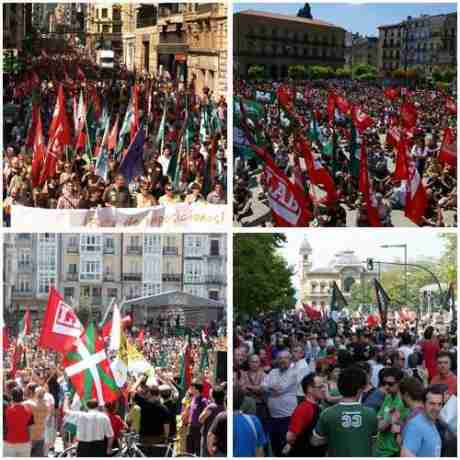
General Strike in the Basque Country
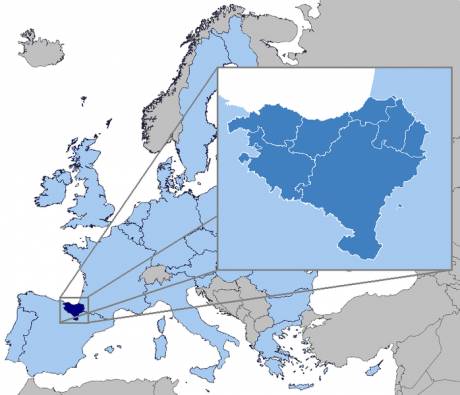
Location of Basque Country
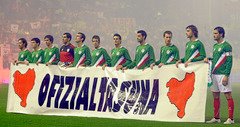
Basque football players demand a Basque selection in sports
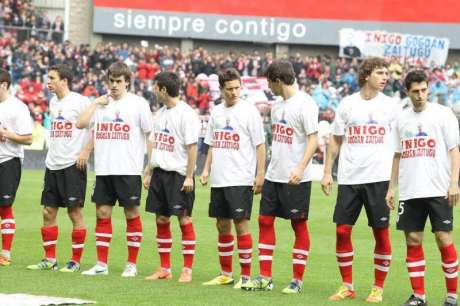
Bilbao Athletic players at game this month wearing T-shirts to express solidarity with family of one of their fans shot by Ertzaintza rubber projectile at short range who later died in hospital
Caption: Video Id: CRaQbIFv0jc Type: Youtube Video
Prisoner solidarity demonstration
|
 international |
rights, freedoms and repression |
feature
international |
rights, freedoms and repression |
feature
 Wednesday April 25, 2012 16:37
Wednesday April 25, 2012 16:37 by Cormac Mac Gall
by Cormac Mac Gall





























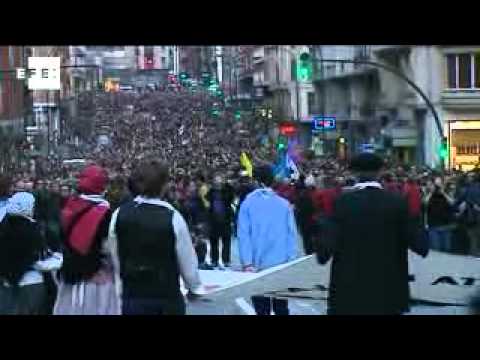
 printable version
printable version

 Digg this
Digg this del.icio.us
del.icio.us Furl
Furl Reddit
Reddit Technorati
Technorati Facebook
Facebook Gab
Gab Twitter
Twitter
View Comments Titles Only
save preference
Comments (3 of 3)
Jump To Comment: 1 2 3Apologies -- it should be clarified that the video (the final image above) is a Spanish TV News one, in which the commentary if full of propaganda as usual. However, it does show the size of the demonstration and even translates the leading slogan. The demonstration was expressly forbidden by the National Court from using the term "political prisoners". The slogan chanted "Etx-er-a!" means "to home" and can be interpreted either as the return of the prisoners to serve their sentences in the Basque Country or as their return home as free men and women.
Also, the Basque Autonomous Region Presidency went originally to the PSOE (Spanish Labour Party), not to the PP, who however combined with the latter to outvote the Basque Nationalist Party, giving the Presidency for the first time in the history of the institution to a party that formally favoured union with the Spanish state. As pointed out in the article, this combined majority vote (of one!) was only possible because of the exclusion on the Abertzale Left party from the elections.
Two interesting and knowledgeable speakers, a good band and DJs, Basque pintxos, stalls, cheap bar -- and entry free (though contributions badly needed to fund the event, not least to pay for posters, many of which were torn down). An event not to be missed.
Herri Batasuna is the only Anti franco and pro rebublic organization, in Spain. I wan't to thank the people who wen't to the demostartion and who is going to the teacher's club for supporting political prisioners. I' ve lost my uncle and my aunt in argentina. I've never had the chance to meet them. Nevertheless, they live in my heart. Some days ago started the trial against the repressors of Rawson jail in Ttrelew i don't thik they will be convicted, besides i don;t belive in bourgeois justice. To sum up, i would like to reaffirm that we can find an agreement on anithing but political prisoners. http://www.filmtrelew.com
http://www.pagina12.com.ar/diario/elpais/1-193529-2012-....html
http://es.wikipedia.org/wiki/Masacre_de_Trelew
I apologize beause all links are in spanish, hoewever, i'm confident that you''l be able to tranlate them.
Many thanks
Best Regards,